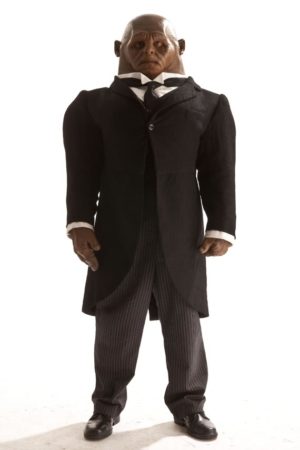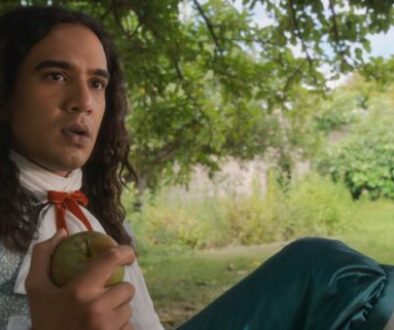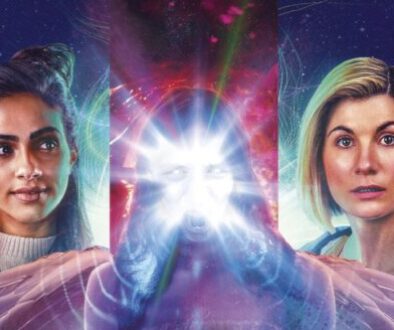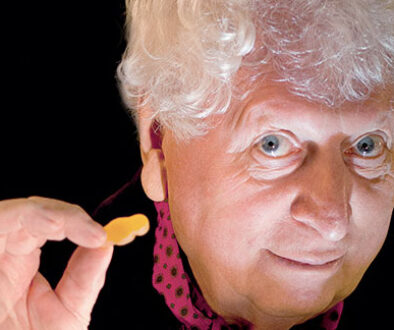2nd Opinion: The Snowmen
John Hussey and Adam James Cuthbert each give their own take on the 2012 Christmas special.
John’s verdict

After another short wait, Doctor Who come flying back onto our screens with yet another bang. Steven Moffat yet again delivered the goods with exciting results and a few nods to the chaotic journey awaiting us next year….
Let’s start off with the lovely Miss Clara Oswin Oswald (although her full name isn’t known to us at first – that would be spoiling the fun). She is a young, plucky adventurous barmaid within Victorian London who by coincidence bumps into the Doctor after noticing a Snowman form itself on the spot. I loved Clara from the word go because she was wise and extremely curious which led her to uncover piece by piece the world of the mysterious Time Lord. The way she does it is very fairy tale-like, a method of story-telling Moffat does well at – which was also done to introduce young Amelia Pond in ‘The Eleventh Hour’ back in 2010 – creating a mysterious journey for both Clara and us the audience. That is of course the idea behind a companion; they are essentially the middlemen in allowing us to step into the show’s mad adventures. I found this companions introduction to be very engaging. It wasn’t done normally. I think that helps with the Doctor’s behaviour.
As we are well aware, back in the mid-series finale in September we witnessed the Ponds’ devastating departure at the hands of the Weeping Angels. Despite both River’s and Amy’s afterword telling the Doctor not to be alone, the Time Lord ultimately sentenced himself into a cold isolation within Victorian London, vowing to never get involved in saving others ever again. This new, cold-hearted Doctor was first seen in the Christmas Prequel ‘The Great Detective’ where his trusted friends Vastra, Jenny and Strax tried to bring him back into the light, but to no avail. We have already seen the Doctor fall into a state of exile after his Tenth incarnation had to erase Donna Noble’s memory, but this time it has a harsher reaction upon his behaviour. This time he becomes cold, uncaring and simply sulks in his complicated box within the clouds. It’s interesting to see the whole ‘A Christmas Carol’ plot used on the Doctor this time round, with Clara trying to repair his soul in time for Christmas. This time it is the Doctor who is lifted half way out of the dark. I think this is what made ‘The Snowmen’ a unique twist within the life of the Doctor. We have never seen him so low and that intrigues me. I like seeing the Doctor dark. It makes him unpredictable, and therefore making the viewer question his authority as a hero. Through this story element, the story became a fun-filled and dark journey of discovery and redemption. It was a fresh introduction for a companion and certainly did its job in allowing the audience to delve into the mind of our favourite Time Lord and feel what he feels.
The reintroduction of Vastra, Jenny and Strax developed a new atmosphere within the show. It really established that Moffat’s era was entering the new stage of its storyline. It also helped to showcase the Doctor’s alien and god-like figure, and enforced the fact that only Clara could save him from his state of depression and anger; a curious little human who should mean nothing to the Time Lord and yet can shine a light back into his hearts, something his friends could not. Their characters are unique in my eyes. I liked them in their debut story ‘A Good Man Goes to War’ and by having them return as reoccurring characters is a step forward within the new direction of the show. Each of them bring their own ideas to the table. Vastra is strong minded and is able to see through the Doctor through her ancient wisdom and echoing nature to the lonely Time Lord. Jenny serves as a companion for Vastra, whilst maintaining her own spark of charm and intellect. Strax serves as a comedy element, allowing the story to establish a lighter tone within the darker tones. Reoccurring characters are always an interesting device to create story and I think like the successful UNIT reoccurrence of the 70s, this one will serve its purpose and help bring more charisma into the new plots to come.

Through the inclusion of Richard E. Grant and Sir Ian McKellen, the show continues its streak of blockbuster elements and larger scaled stories. Doctor Simeon is the villain of the piece played by Grant, a man very familiar to Doctor Who through his spin-off work on ‘The Curse of Fatal Death’ and ‘Scream of the Shalka’. He plays him perfectly, giving off a complete sinister nature full of dark ambition and lack of emotion towards humanity. Grant is one of those actors who are born to play a good old fashioned villain. I felt him and Matt played off each other’s strengths and created the perfect hero/villain conflict. The Snowmen (voiced by McKellen) are an interesting twist to the Special as they are usually a symbol of the festive spirit of Christmas but are now turned into killer beasts that stalk humans within the cold air of Victorian England. A chilling voice by McKellen followed by a sinister face of fear and evil; Moffat certainly has a reputation of turning the norm into the deadly. Also he adds in his favourite trick of the villain being driven by the mind. Imagine trying not to think about a Snowman. That would be quite hard. One of the wonderful twists of the tale is the revealing that the thing in the Globe is actually the Great Intelligence, an enemy first seen in Troughton’s story ‘The Abominable Snowmen’. Although its servants, the Yeti didn’t make an appearance, Moffat has cleverly given the impression that this is the origin of the creature and through its encounter with a future Doctor, will go on to try and reform itself in Tibet and then go on to invade the London Underground. I also suppose the Snowmen are a massive influence for its use of the Abominable Snowmen as servants. It’s in the name. This all adds to the massive build up of the 50th Anniversary next year. Moffat’s use of nostalgia is really giving me hope that he will do the right thing when it comes to celebrating 50 years of the show’s legacy.
The final twist in the tale is the revealing of Clara’s full name: Clara Oswin Oswald. This I did not see coming and was gob-smacked to see the revelations that unfolded at the end of the story. It was hinted throughout that there was some kind of connection between the two characters due to certain phrases and sentences Clara said, matching that of the characteristics of Oswin. But the big question is; what does it all mean and how is it possible? How can the same woman be living too separate lives and meet the Doctor? I guess we’ll begin to find out in the opening episode of Series 7: Part 2 when we’re introduced to modern-day Earth Clara. All I can say is there goes my theories of Jenna’s involvement in ‘Asylum of the Daleks’ being a clever introduction stunt.
Christmas has sadly come and gone, but by heck, Doctor Who certainly isn’t stopping. We get a short break to digest this new revelation before we are thrown back into the deep end for more mad and complicated adventures in time and space. After the introduction of a brand new and exciting title sequence and console room, along with the second half promising the return of some old enemies and reconstructed Cybermen, I can safely say the future looks bright. Bring on 2013!
Adam’s verdict
I’ll be frank: this review was difficult to write, and that’s because I find myself growing increasingly jaded concerning Steven Moffat’s ongoing attitude towards the show. If The Angels Take Manhattan did little to appease my doubts, then I’d hoped The Snowmen would be the fresh start both the writer and show needed. Moffat had already demonstrated Christmastime exemplified his strengths as a writer, bolstered by the success of his initial series, with the acclaimed A Christmas Carol. Perhaps it’s coincidental that a sufficiently strong series resulted in an unparalleled piece of storytelling, while a lacklustre series produced the opposite. So The Snowmen was something of a risk: would it repeat his earlier success; would we the signs of that once scintillating intelligence re-emerging from the impinging shadows of series 6? The short answer is no. The Snowmen has served only to reinforce my interpretation of Moffat: potentially enriching themes, ideas, and characters remain underdeveloped, and those that are suffer from a flawed premise and/or execution.
 There were a number of bugbears that detracted from my potential enjoyment of the episode. I’m well-aware the Paternoster Gang has attracted an audience, and while I understand their future role as allies of the Doctor (as opposed to UNIT and Kate Stewart?) their presence was overlong and restricted any opportunity to explore the guest characters of Captain Latimer and Doctor Walter Simeon in depth. Both Tom Ward and Richard E Grant delivered understated performances in their respective roles, and it’s a shame they weren’t more of the focus. I’ll concede the ‘One-Word Question’ scene was fairly entertaining (although why one-word responses were even necessary, or how Clara knew the right word to rouse the Doctor’s spirits, is a mystery) but I could have done without the close-ups on Vastra’s face. The ‘humanisation’ of the Silurians has never settled with me. What made the original designs so wonderfully creative was the distinctly primeval, non-human morphology of the species – as embodiments of the ‘Other’; as pertaining to themes of xenophobia – so the redesign has proven problematic with my personal preference for the Silurians.
There were a number of bugbears that detracted from my potential enjoyment of the episode. I’m well-aware the Paternoster Gang has attracted an audience, and while I understand their future role as allies of the Doctor (as opposed to UNIT and Kate Stewart?) their presence was overlong and restricted any opportunity to explore the guest characters of Captain Latimer and Doctor Walter Simeon in depth. Both Tom Ward and Richard E Grant delivered understated performances in their respective roles, and it’s a shame they weren’t more of the focus. I’ll concede the ‘One-Word Question’ scene was fairly entertaining (although why one-word responses were even necessary, or how Clara knew the right word to rouse the Doctor’s spirits, is a mystery) but I could have done without the close-ups on Vastra’s face. The ‘humanisation’ of the Silurians has never settled with me. What made the original designs so wonderfully creative was the distinctly primeval, non-human morphology of the species – as embodiments of the ‘Other’; as pertaining to themes of xenophobia – so the redesign has proven problematic with my personal preference for the Silurians.
Unlike The Next Doctor or A Christmas Carol, there was a lack of a consistent ambience throughout the story. Although Victoriana London was extensively recreated, the pacing and atmosphere were horribly disjointed and confused, as it attempted to combine sundry, disparate elements into a coherent whole. Was it a festive, whimsical fairy-tale? Or an exploration into the Doctor’s troubled psyche, his bereavement and guilt eclipsing any positivity in his life; with the streets of Victorian London becoming a symbolic labyrinth of his search for an escape from his past? Or was it intended to be a story about an estranged father reconciling with his children in time for Christmas? If the Paternoster Gang had been eliminated, and the focal point of the narrative had either been on the Doctor – say coming to terms with his recent loss, the audience witnessing minute details like the Doctor adopting his new attire, over a passage of time (rather than bypassing such details; which appear trivial, but are rather rich with consequence) – or on Captain Latimer, and his relationship with his children and governess, the Doctor acting as a figure in the shadows, who encourages Latimer to voice his secret affections for Clara, then The Snowmen could certainly have risen to the quality of A Christmas Carol. As it stands, the Doctor’s darker turn was ultimately pointless, as he brightens up all too quickly (why didn’t he just walk away when Clara called after him, if he was truly self-absorbed and distanced from humanity these days?), which seems contrary to initial impressions that the Doctor is gradually darkening over the course of the series. (In a way, I’ve pictured his dynamic with Clara as being reminiscent of the Seventh Doctor’s avuncular relationship with Ace, the Doctor mentoring Clara whilst uncovering the mystery behind her (as Ace was one of the wolves of Fenric, perhaps too Clara is an instrument of a greater force): whether or not this will be the case remains unseen.) One of the joys of A Christmas Carol was the emphasis on characterisation, presenting a few key ideas that were unpacked and deconstructed, while being intelligible to a viewing audience. The Snowmen lost any sense of direction in its cumbersome exposition and ill-fraught juxtaposition of scenes.
Finally, the title sequence and theme-tune are much improved, and while I’m not keen on the redesign of the TARDIS interior (or the lack of elucidation within the story itself) it looks like Journey to the Centre of the TARDIS may surprise me yet.
[You can read more of Adam’s thoughts at Cult Fix.]








